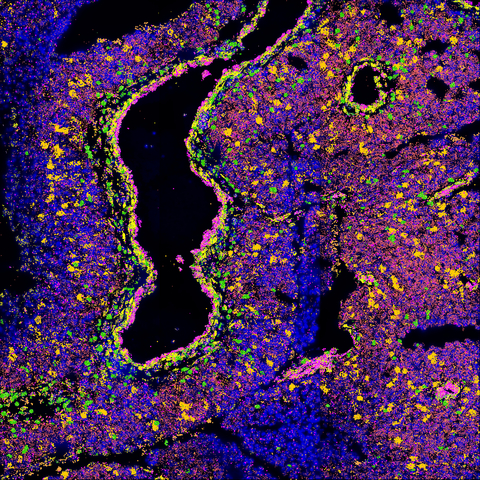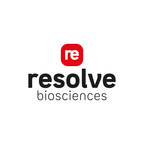Resolve Biosciences , the pioneer in Molecular Cartography™ technology, today announced the expansion of its end-to-end Meridian service offering for spatial transcriptomics data.
Customers can now access company’s groundbreaking technology without an instrument purchase to quickly generate the industry's highest-quality 3D spatial transcriptomics data
MONHEIM AM RHEIN, Germany--(BUSINESS WIRE)-- Resolve Biosciences, the pioneer in Molecular Cartography™ technology, today announced the expansion of its end-to-end Meridian service offering for spatial transcriptomics data. Scientists who do not have access to their own system can now submit a broad range of samples, including fresh-frozen, fixed, or FFPE tissue, and receive highly multiplexed in situ gene expression data from Resolve Biosciences’ team of technical experts. The program is designed to get results to customers faster, enabling them to glean new insights and make new discoveries as quickly as possible. The company will unveil its expanded Meridian service program and discuss the latest advances in Molecular Cartography technology at this week’s Advances in Genome Biology and Technology (AGBT) General Meeting.
This press release features multimedia. View the full release here: https://www.businesswire.com/news/home/20230206005214/en/

Resolve Biosciences Molecular Cartography™ technology was used to spatially resolve distinct cell populations by using specific gene markers in the perivascular niche microenvironment in a mouse primary melanoma tumor. Image courtesy of Jean-Christophe Marine, Laboratory for Molecular Cancer Biology, VIB-KU Leuven.
“The quality of the data and amount of information generated from the Meridian Molecular Cartography service was very impressive,” said Satdarshan (Paul) S. Monga, MD, Endowed Chair for Experimental Pathology at the University of Pittsburgh Medical Center and Director of Pittsburgh Liver Research Center. “We were able to clearly visualize subcellular gene expression activity with unparalleled sensitivity and specificity.”
“From day one, the team at Resolve Biosciences has been laser-focused on improving data quality and making our Molecular Cartography platform the industry’s most accessible and adaptable spatial biology system,” said Jason T. Gammack, co-founder and CEO of Resolve Biosciences. “With our expanded Meridian service offering, more customers can now apply the full power of our Molecular Cartography system to virtually any species or tissue type, including FFPE. We have seen customers go from sample submission to manuscript in just a few weeks, demonstrating the remarkable acceleration of science our service makes possible.”
Technology Accessibility
Researchers around the world can take advantage of the Meridian service offering to gain access to Resolve Biosciences’ proprietary, highly multiplexed, single-molecule fluorescence in situ hybridization technology. From custom panel design to data analysis, the complete spatial transcriptomics workflow can be optimized by the company’s scientific team to meet the specific requirements for each project. Unlike other spatial analysis techniques, the system provides the required 3D accuracy, sensitivity, and specificity to elucidate a cell’s complex transcriptional landscape. The deep contextual data sets illuminate molecular interactions while preserving sample tissue for future analysis. For more information on the Meridian service program, please visit www.resolvebiosciences.com/meridian-services.
Workflow Flexibility
Resolve Biosciences’ pioneering Molecular Cartography technology was designed for the multiplexing needs of most scientists in basic, translational, and clinical research. Over the past two years, the technology has revealed numerous insights in neurology, oncology, developmental biology, and many other important biological research areas. The technology has now been used to process more than 50 tissue types and has already been cited in more than 15 manuscripts and peer-reviewed scientific publications.
Resolve will begin offering FFPE tissue capabilities as part of its Meridian service program and will add the feature to its commercial Molecular Cartography systems later this year. In the future, the company will continue to enhance the modular platform by incorporating the interrogation of DNA, protein, and metabolomic data layers.
AGBT 2023 General Meeting
Resolve Biosciences is a proud bronze sponsor of the AGBT General Meeting, taking place this week in Hollywood, Fla. The company will share insights into critical components of spatial biology data quality and showcase the latest scientific advances made possible by its Molecular Cartography workflow during its workshop and throughout the meeting in Suite #213. For more information on the company’s AGBT activities, please visit www.resolvebiosciences.com/agbt-2023.
Bronze Sponsorship Workshop: Wednesday, Feb. 8th at 3:20 pm ET in Grand Ballroom
Spatial Transcriptomics Without Compromising Data Quality
Jeroen Aerts, PhD, Customer Technology Advisor, Resolve Biosciences
About Resolve Biosciences
Resolve Biosciences is applying the power of Molecular Cartography™ technology to enable scientists to gain new insights based on the highest-resolution view of spatial biology. The complete system features the company's proprietary, highly multiplexed, single-molecule detection technology, which offers full spatial context at subcellular resolution, all in a fully automated workflow that preserves the sample tissue. The Molecular Cartography technology offers unparalleled sensitivity and specificity to help scientists detect individual transcripts and rare signals to interpret fundamental biology and to rapidly advance the understanding of complex biological questions in critical fields such as oncology, neuroscience, infectious disease, and agriculture. Resolve Biosciences is privately held and based in Monheim am Rhein, Germany, with a North American facility and laboratory in San Jose, Calif. For additional information, visit www.resolvebiosciences.com.
Resolve Biosciences, the Resolve Biosciences logo, and Molecular Cartography are trademarks of Resolve Biosciences.
View source version on businesswire.com: https://www.businesswire.com/news/home/20230206005214/en/
Source: Resolve Biosciences
Smart Multimedia Gallery
Resolve Biosciences Molecular Cartography™ technology was used to spatially resolve distinct cell populations by using specific gene markers in the perivascular niche microenvironment in a mouse primary melanoma tumor. Image courtesy of Jean-Christophe Marine, Laboratory for Molecular Cancer Biology, VIB-KU Leuven.







